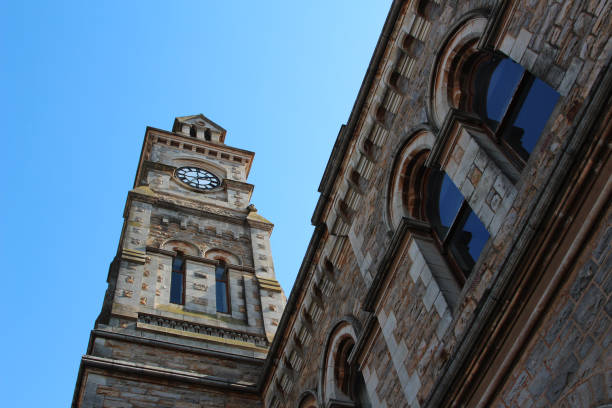The executive council of the Eastern Cape has resolved to have drought in this province declared a disaster and processes to gazette it are under way. Meanwhile, following a R1 million pledge by Vodacom towards drilling boreholes, Premier Oscar Mabuyane has appealed to the private sector to contribute towards drought mitigation.
The National Disaster Management Centre reclassified the drought as a national disaster last year. This was gazetted on 13 February 2018. A statement from the Department of Co-operative Governance at the time said this followed consultations with provincial disaster management centres and a thorough reassessment of the magnitude and severity of the ongoing drought condition in the country.
The classification of a situation as a national disaster means the national executive has the main responsibility of coordinating and managing it. They are mandated to use contingency plans and legislative mechanisms at their disposal to effectively deal with the effects of the disaster, in close cooperation with provincial and local government, the private sector and civil society. This may include providing financial assistance and/ or other relief materials to municipalities and communities. The centralisation of responsibility is meant to better coordinate the response across the spheres of government, the private sector and civil society.
The process of declaring a drought is done at either local (municipal), district or provincial level. For drought in a province to be declared a national disaster, that province must motivate to the National Disaster Management Centre (NDMC) for that classification. According to the Disaster Management Act, drought disaster classification remains valid for three months, after which it must be redeclared.
Here in Makana Municipality, a state of drought disaster has previously been declared several times over the past five years. Most recently, the Sarah Baartman District Municipality undertook the drought declaration process on behalf of Makana and the other local municipalities under its jurisidiction.
In a statement released Wednesday 23 October, Eastern Cape Premier Oscar Mabuyane said the provincial Cabinet had resolved to have the drought in this province declared a disaster and processes to gazette this were under way.
“One of the issues that delayed the gazetting was that some municipalities were in the process of [individually]declaring disaster,” Mabuyane said. “We have Sarah Baartman, Chris Hani, Amathole, Alfred Nzo, and Nelson Mandela municipalities that have been declared by their councils as disaster areas. We are aware that Joe Gqabi District and the OR Tambo District Municipalities have recently declared drought in their municipalities.”
The process of declaration and gazetting would result into financial resources being set aside by the government for drought mitigation programmes. However, Mabuyane said, this did not mean there would be “new” money coming in.
“The government will [re-]prioritise from [existing]allocated funds in order to speed up interventions to households and farmers that do not have water as a result of drought,” Mabuyane explained.
He said Vodacom had offered R1 million towards drilling boreholes in the province.
“We will use this money to drill water from underground to give households and farmers hard hit by drought access to water. We welcome this investment as a shot-in the-arm to our emergency drought relief programme in the province.”
Mabuyane appealed to others in the private sector willing to make similar contributions to approach the government “so that we have a coordinated programme responding to drought”.
The Eastern Cape has been experiencing varying levels of drought since 2015. Greatly reduced rainfall during normally rainy seasons has resulted in reduced access to water for households, as well as farmers for crop irrigation and livestock.
“This drought demands that a number of government institutions from national, provincial and local government put together resources to mitigate drought in the province,” Mabuyane said. He said provincial government departments and municipalities had provided material support, including water tanks and animal feed to help mitigate the drought’s effects.
In the current financial year, a number of government departments, especially the Department of Rural Development and Agrarian Reform and the municipalities affected by drought, continued to provide drought relief support, he said.
He said communities and farmers struggling to manage water shortages should contact relevant government departments to help them with emergency relief.
“Because we are dealing with extreme reduced rainfall, the net effect of the current weather conditions is the reduction of dam levels,” Mabuyane said. “It is painful that this affects livelihoods and the economy of the province.”
The drought in Sarah Baartman District Municipality was declared a local state of disaster through the Disaster Management Act 57 of 2002. It was gazetted in February 25 2019.
Makana Municipality has previously been allocated various amounts in drought relief funding, including R22 million by the Department of Water and Sanitation.
In March 2018, then Co-operative Governance Minister Zweli Mkhize announced the allocation of R433.524 million from the Disaster Grants administered by COGTA as immediate disaster relief funding for drought within the three most affected provinces (Eastern, Northern and Western Cape Provinces) over the 2017/18 and 2018/19 financial years.
Of the R104.7 million allocated to the Eastern Cape, R810 000 was allocated to Makana Municipality to boost water infrastructure funding.
The humanitarian relief organisation Gift of the Givers provided emergency supplies of water during a protracted water outage at the beginning of this year and, as the western supply dams dried up, went on to drill boreholes at various locations in Makana Municipality. The organisation was outraged and withdrew from Makhanda in May when it emerged that tenders were being finalised for work the organisation said they’d already completed. Gift of the Givers have continued to provide emergency relief, including water, to households and charities in and around the town. They have gone on to similarly assist in Adelaide and Graaff Reinet, as those towns’ supply dams dry up completely. Gift of the Givers has also provided fodder to farmers in drought-stricken areas.



